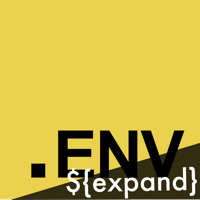🎉 announcing
dotenvx.
expansion AND command substitution, multi-environment, encrypted envs, and more.
dotenv-expand 

Dotenv-expand adds variable expansion on top of dotenv. If you find yourself needing to expand environment variables already existing on your machine, then dotenv-expand is your tool.



Install
npm install dotenv-expand --save
Or installing with yarn? yarn add dotenv-expand
Usage
Create a .env file in the root of your project:
PASSWORD="s1mpl3"
DB_PASS=$PASSWORD
As early as possible in your application, import and configure dotenv and then expand dotenv:
const dotenv = require('dotenv')
const dotenvExpand = require('dotenv-expand')
dotenvExpand.expand(dotenv.config())
console.log(process.env)
That's it. process.env now has the expanded keys and values you defined in your .env file.
dotenvExpand.expand(dotenv.config())
...
connectdb(process.env.DB_PASS)
Preload
Note: Consider using dotenvx instead of preloading. I am now doing (and recommending) so.
It serves the same purpose (you do not need to require and load dotenv), has built-in expansion support, adds better debugging, and works with ANY language, framework, or platform. – motdotla
You can use the --require (-r) command line option to preload dotenv & dotenv-expand. By doing this, you do not need to require and load dotenv or dotenv-expand in your application code. This is the preferred approach when using import instead of require.
$ node -r dotenv-expand/config your_script.js
The configuration options below are supported as command line arguments in the format dotenv_config_<option>=value
$ node -r dotenv-expand/config your_script.js dotenv_config_path=/custom/path/to/your/env/vars
Additionally, you can use environment variables to set configuration options. Command line arguments will precede these.
$ DOTENV_CONFIG_<OPTION>=value node -r dotenv-expand/config your_script.js
$ DOTENV_CONFIG_ENCODING=latin1 node -r dotenv-expand/config your_script.js dotenv_config_path=/custom/path/to/.env
Examples
See tests/.env.test for simple and complex examples of variable expansion in your .env
file.
Documentation
dotenv-expand exposes one function:
Expand
expand will expand your environment variables.
const env = {
parsed: {
BASIC: 'basic',
BASIC_EXPAND: '${BASIC}',
BASIC_EXPAND_SIMPLE: '$BASIC'
}
}
console.log(dotenvExpand.expand(env))
Options
processEnv
Default: process.env
Specify an object to write your secrets to. Defaults to process.env environment variables.
const myEnv = {}
const env = {
processEnv: myEnv,
parsed: {
HELLO: 'World'
}
}
dotenvExpand.expand(env)
console.log(myEnv.HELLO)
console.log(process.env.HELLO)
FAQ
What rules does the expansion engine follow?
See a full list of rules here.
How can I avoid expanding pre-existing envs (already in my process.env, for example pas$word)?
As of v12.0.0 dotenv-expand no longer expands process.env.
If you need this ability, use dotenvx by shipping an encrypted .env file with your code - allowing safe expansion at runtime.
How can I override an existing environment variable?
Use dotenvx as dotenv-expand does not support this.
dotenv-expand is a separate module (without knowledge of the loading of process.env and the .env file) and so cannot reliably know what to override.
Contributing Guide
See CONTRIBUTING.md
CHANGELOG
See CHANGELOG.md
Who's using dotenv-expand?
These npm modules depend on it.









